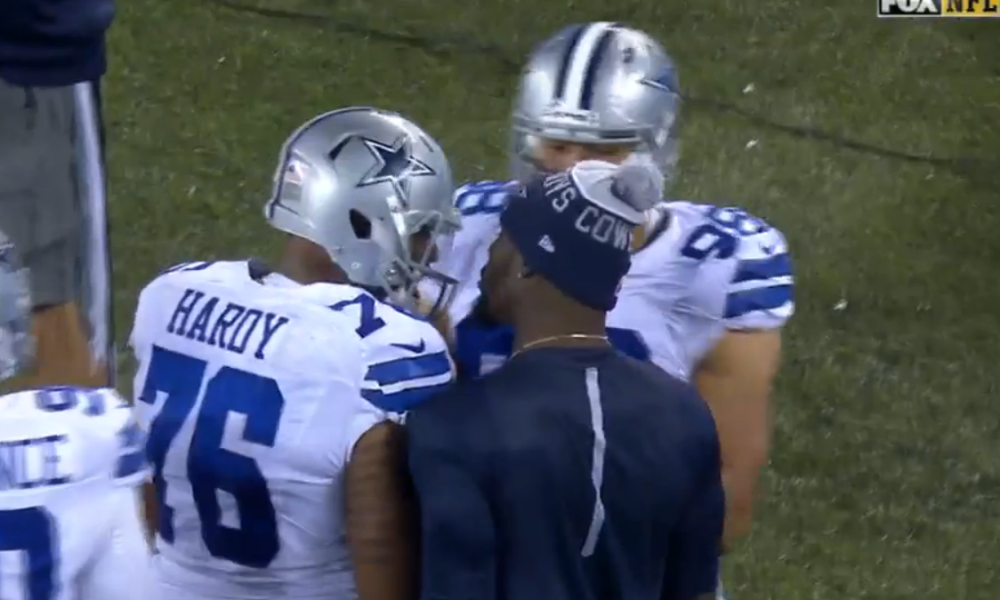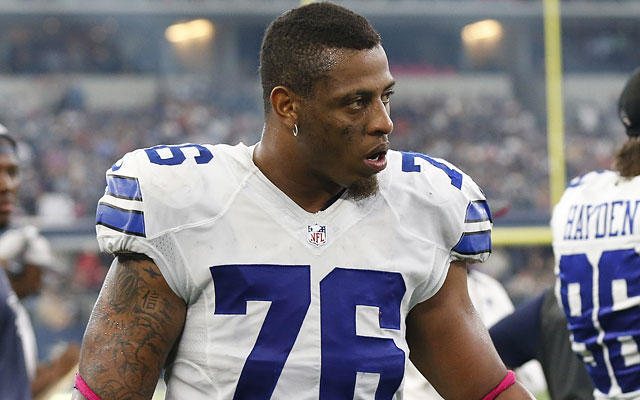Smart football players – passionate or not – must know their role
Since the inception of our website, Football Perspectives by Football Players (FBF), we have remained steadfast in our mission: to offer an authentic football perspective that deeply resonates with players.
Our primary goal is to provide an unfiltered portrayal of the myriad challenges, triumphs, and hurdles intrinsic to the nation’s beloved game.
A poignant incident that vividly illustrates the intricate inner workings of football came to the forefront when Dallas Cowboys DE Greg Hardy inserted himself into his team’s kick return huddle.
With intensity, he directly confronted special teams coordinator Rich Bisaccia, inadvertently displacing a clipboard from his grasp and embroiling himself in a physical altercation with several players.
The immediate aftermath spun a narrative that cast Hardy as an unpredictable and uncontrollable presence.
Jerry Jones, in his characteristic earnestness, endorsed Hardy’s actions as an unconventional form of leadership, unwittingly igniting a topic that readily sparked nationwide discourse.
This incident inevitably steered conversations toward Hardy’s prior off-field controversies during his tenure with the Panthers, thereby shedding light on potential organizational tolerance.
While such deliberations indeed warrant exploration, they often overshadow a fundamental football concern that underlies Hardy’s actions—namely, an issue intrinsic to the intricate ecosystems thriving within professional football teams, a facet commonly overlooked by both fans and the media.
It is of paramount importance to recognize that the crux of this matter extends beyond Hardy’s behavior or his history; it delves deep into the intricate dynamics that underpin a professional football team.
Although critiquing kickoff coverage units may not be within the conventional purview of defensive linemen like Hardy, this incident serves as a stark reminder of the broader football culture revolving around camaraderie, mutual respect, and a collective drive for success.
At FBF, our mission is to meticulously peel back the layers and unveil the genuine essence of football—its intricacies, its adversities, and its victories.
By doing so, we aspire to provide an all-encompassing comprehension of the multifaceted realm that lies beneath the surface of the cherished game we all hold dear.
Setting aside the debate over Greg Hardy’s role as a vocal leader within the Cowboys team, a substantial football-oriented concern arises concerning whether ANY defensive lineman should assume the role of delivering a stern rebuke to an underperforming unit on a football team to which they don’t belong.
Personally, my NFL upbringing has instilled in me the ethos of “Do Your Job,” which likely shapes my distinct perspective on the boundaries within a football team. I stand resolutely behind this perspective, as it has proven to be more effective than alternative approaches.
Engaging in an animated exchange with a coach or player on the sideline, akin to Hardy’s actions, doesn’t significantly concern me—unless such actions transgress the boundaries of one’s own responsibilities.
This is when what might have been positive passion morphs into an act of selfishness. For instance, the veteran leaders of the Cowboys’ special teams wouldn’t conceivably invade the defensive line huddle on the sideline after executing a pinpoint punt, only to see the defense allow an end-to-end offensive drive. The idea of them doing so is simply ludicrous.
On a football team, distinct boundaries hold immense importance. Each unit possesses its own set of leaders.
Just as it would be out of place for a quarterback to venture into the linebacker area of the sideline to berate the defense, the same player should be redirected to his designated area—akin to an ejection seat on a jet.
Professional football is firmly rooted in accountability, and there are moments when individuals must be held to account.
However, such calls to action should stem exclusively from within one’s own group, on their side of the ball, or through directives from the coaching staff.
Within a well-structured football team, impassioned debates—even occasional, minor physical confrontations—are par for the course.
Such moments exemplify the essence of football. However, this dynamic should remain confined within one’s own team ecosystem.
The moment such exchanges transcend those boundaries is when genuine issues emerge.
The source of frustration that strikes a particularly sensitive chord with me is the prevailing oversight, one that resonates deeply regarding the coverage—more accurately, the lack thereof—of special teams playing during TV broadcasts.
This neglect has bred a national sentiment that perilously suggests that the sole purpose of these units is to bolster the efforts of the offense and defense. Such a notion is an absurd departure from the essence of football.
Every single play on the field carries intrinsic significance, independent of any other unit’s function or the pursuit of contrived quarterback records that hold no real weight.
The disconcerting aspect emerges from the fact that the NFL, led by individuals with limited football insight, such as Roger Goodell, is systematically eroding components of special teams’ play, most notably kickoffs.
This trend is emblematic of a skewed, TV-centric interpretation of the game—an interpretation that tragically disregards the core ethos of football.
In truth, each play, including those executed by special teams, possesses inherent value. The genuine essence of football lies in recognizing that every action stands on its own merits, unaffected by the needs of other units or the pursuit of superficial accolades.
Special team play is far from an auxiliary act; it is a fundamental element of the intricate football tapestry.
The failure to appreciate this profound aspect is indicative of a misunderstanding that transcends the realm of the game itself.
It underscores the urgent need to reconnect with the true spirit of football, one that extends beyond the boundaries of televised entertainment and embodies the unwavering commitment to the sport’s essence.

The predicament with a player from a disparate unit chastising another lie in its propensity to cultivate an unwarranted hierarchy within the game—a hierarchy that remains absent within the framework of exceptional football teams.
The intrusion of an unrelated player, like Hardy, into the dynamics of a kick return unit during their attempts to synchronize communication for the subsequent play can have far-reaching consequences.
Such an intrusion might inadvertently pave the way for an unimpeded opponent on the next return due to sideline disruptions preceding the play, thus severely compromising crucial communication protocols.
It’s noteworthy that the majority of special teams members on most teams also hold substantive roles within the offense and defense. This underscores the fact that a football team is an integrated entity, not a segmented caste system.
The crux of the matter aligns with Bisaccia’s subsequent explanation, articulating that the timing and setting were fundamentally inappropriate for Hardy’s actions.
His intervention proved to be self-serving, upending the team’s concerted efforts for the ensuing play.
In addition to Hardy’s actions being entirely beyond the scope of his involvement, they injected an element of disruption that impeded the team’s objectives.
Even possessing extraordinary prowess as a pass rusher does not automatically grant a player jurisdiction over matters outside of their purview.
The distinction between roles on a football team remains sacrosanct, and no player, regardless of their individual accomplishments, holds a carte blanche to encroach upon the functions of another unit.
This episode serves as a tangible reminder of the importance of respecting these boundaries—a testament to the principle that a football team thrives as a cohesive unit when all players are attuned to their designated roles.
Football stands as the epitome of a team sport, and our platform has been unswervingly dedicated to illuminating the paramount team dynamics intrinsic to the game.
A core facet of comprehending the essence of a team sport rests in discerning not only the genesis but also the boundaries of individual roles.
This delineation, delineating where one’s sphere of influence commences and, just as crucially, concludes, is pivotal.
Irrespective of the accumulation of sacks or touchdowns, a harmonious team member grasps the insignificance of their perspective on a group to which they do not belong.
The principle hinges on recognizing that individual opinions, regardless of one’s personal achievements, remain inconsequential when it pertains to a unit that operates beyond their sphere of expertise.
Consider, for instance, the notion that Greg Hardy wouldn’t likely welcome the unsolicited input of Jason Witten, Darren McFadden, or Dan Bailey critiquing the defensive line for yielding excessive rushing yards or inadequately pressuring the quarterback.
This principle is universal and should be steadfastly upheld by astute football teams.
While ardently embracing the role of a fervent leader within a team is indeed commendable, its efficacy is contingent upon its alignment with the right approach.
Consequently, the most salient message conveyed by fellow players and coaches to Greg Hardy, away from the public eye, should unequivocally underscore the cardinal importance of comprehending and adhering to one’s designated role.
This, in essence, embodies the crux of the matter—a message that resonates with clarity across all corners of a well-informed and cohesive football team.

